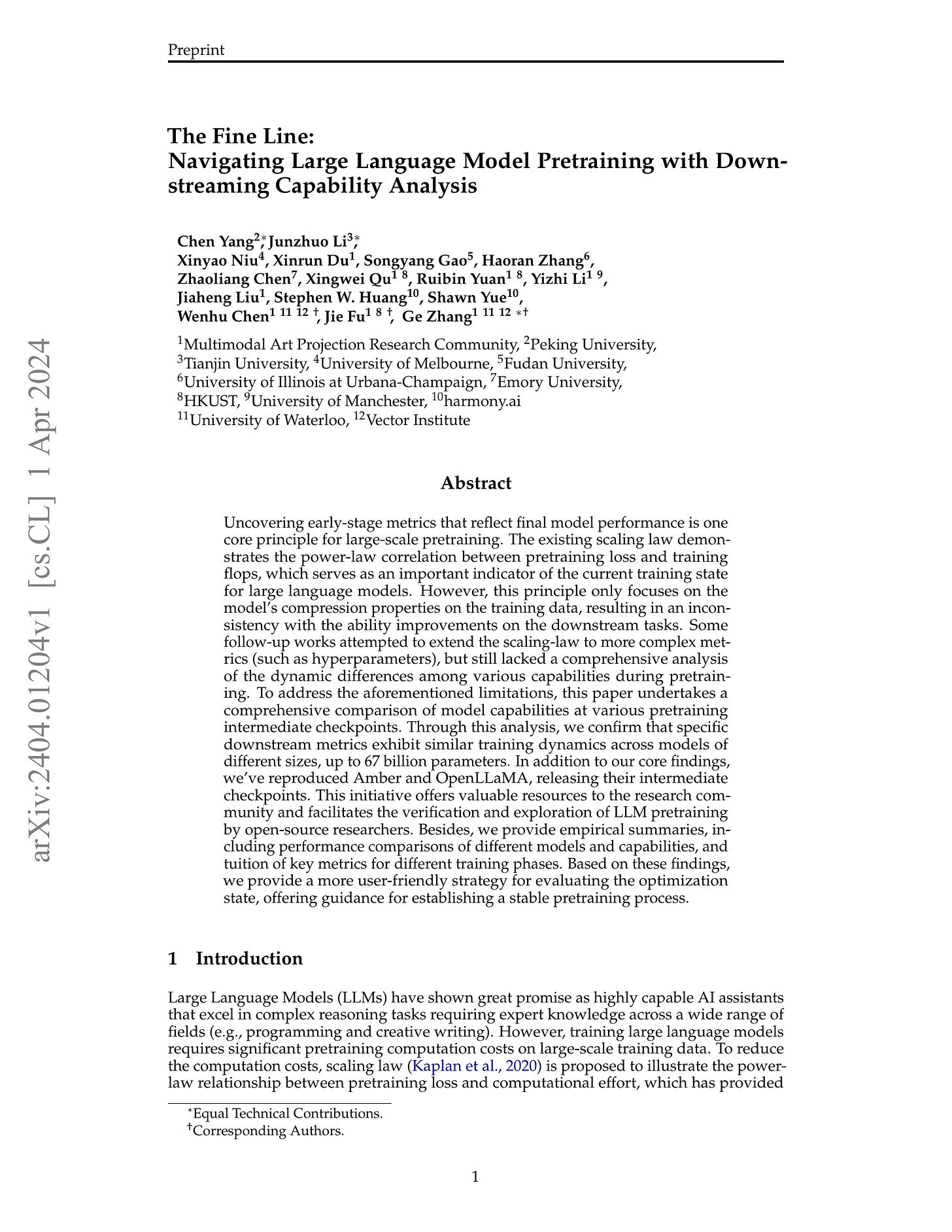2024년 4월 2일
The Fine Line: Navigating Large Language Model Pretraining with Down-streaming Capability Analysis
(Chen Yang, Junzhuo Li, Xinyao Niu, Xinrun Du, Songyang Gao, Haoran Zhang, Zhaoliang Chen, Xingwei Qu, Ruibin Yuan, Yizhi Li, Jiaheng Liu, Stephen W. Huang, Shawn Yue, Wenhu Chen, Jie Fu, Ge Zhang)
Uncovering early-stage metrics that reflect final model performance is one core principle for large-scale pretraining. The existing scaling law demonstrates the power-law correlation between pretraining loss and training flops, which serves as an important indicator of the current training state for large language models. However, this principle only focuses on the model's compression properties on the training data, resulting in an inconsistency with the ability improvements on the downstream tasks. Some follow-up works attempted to extend the scaling-law to more complex metrics (such as hyperparameters), but still lacked a comprehensive analysis of the dynamic differences among various capabilities during pretraining. To address the aforementioned limitations, this paper undertakes a comprehensive comparison of model capabilities at various pretraining intermediate checkpoints. Through this analysis, we confirm that specific downstream metrics exhibit similar training dynamics across models of different sizes, up to 67 billion parameters. In addition to our core findings, we've reproduced Amber and OpenLLaMA, releasing their intermediate checkpoints. This initiative offers valuable resources to the research community and facilitates the verification and exploration of LLM pretraining by open-source researchers. Besides, we provide empirical summaries, including performance comparisons of different models and capabilities, and tuition of key metrics for different training phases. Based on these findings, we provide a more user-friendly strategy for evaluating the optimization state, offering guidance for establishing a stable pretraining process.
LLM 체크포인트들을 모아서 학습 시점 당 Downstream 과제에 대한 퍼포먼스의 변화와 Scaling Law를 측정. 데이터 전처리, 비율, 단계에 따른 구분까지 고려하면 서로 비교한다는 것이 어렵긴 합니다만 그래도 재미있는 것을 찾을 수 있을지도 모르겠네요.
#scaling-law
Exploring the Mystery of Influential Data for Mathematical Reasoning
(Xinzhe Ni, Yeyun Gong, Zhibin Gou, Yelong Shen, Yujiu Yang, Nan Duan, Weizhu Chen)
Selecting influential data for fine-tuning on downstream tasks is a key factor for both performance and computation efficiency. Recent works have shown that training with only limited data can show a superior performance on general tasks. However, the feasibility on mathematical reasoning tasks has not been validated. To go further, there exist two open questions for mathematical reasoning: how to select influential data and what is an influential data composition. For the former one, we propose a Quality-aware Diverse Selection (QaDS) strategy adaptable for mathematical reasoning. A comparison with other selection strategies validates the superiority of QaDS. For the latter one, we first enlarge our setting and explore the influential data composition. We conduct a series of experiments and highlight: scaling up reasoning data, and training with general data selected by QaDS is helpful. Then, we define our optimal mixture as OpenMathMix, an influential data mixture with open-source data selected by QaDS. With OpenMathMix, we achieve a state-of-the-art 48.8% accuracy on MATH with 7B base model. Additionally, we showcase the use of QaDS in creating efficient fine-tuning mixtures with various selection ratios, and analyze the quality of a wide range of open-source datasets, which can perform as a reference for future works on mathematical reasoning tasks.
Diversity-Quality 필터링의 한 사례. 수학 Instruction 데이터에 대해서 했군요. Diversity는 임베딩 Coreset Sampling을 썼고 Quality에 대해서는 1-shot으로 줬을 때의 확률 변화를 사용했군요. (https://arxiv.org/abs/2312.10302) 1-shot 스코어가 얼마나 괜찮은지 불확실성이 있긴 하지만 여튼 기본적으로 생각해볼 수 있는 세팅일 것 같습니다.
#dataset
FABLES: Evaluating faithfulness and content selection in book-length summarization
(Yekyung Kim, Yapei Chang, Marzena Karpinska, Aparna Garimella, Varun Manjunatha, Kyle Lo, Tanya Goyal, Mohit Iyyer)
While long-context large language models (LLMs) can technically summarize book-length documents (>100K tokens), the length and complexity of the documents have so far prohibited evaluations of input-dependent aspects like faithfulness. In this paper, we conduct the first large-scale human evaluation of faithfulness and content selection on LLM-generated summaries of fictional books. Our study mitigates the issue of data contamination by focusing on summaries of books published in 2023 or 2024, and we hire annotators who have fully read each book prior to the annotation task to minimize cost and cognitive burden. We collect FABLES, a dataset of annotations on 3,158 claims made in LLM-generated summaries of 26 books, at a cost of $5.2K USD, which allows us to rank LLM summarizers based on faithfulness: Claude-3-Opus significantly outperforms all closed-source LLMs, while the open-source Mixtral is on par with GPT-3.5-Turbo. An analysis of the annotations reveals that most unfaithful claims relate to events and character states, and they generally require indirect reasoning over the narrative to invalidate. While LLM-based auto-raters have proven reliable for factuality and coherence in other settings, we implement several LLM raters of faithfulness and find that none correlates strongly with human annotations, especially with regard to detecting unfaithful claims. Our experiments suggest that detecting unfaithful claims is an important future direction not only for summarization evaluation but also as a testbed for long-context understanding. Finally, we move beyond faithfulness by exploring content selection errors in book-length summarization: we develop a typology of omission errors related to crucial narrative elements and also identify a systematic over-emphasis on events occurring towards the end of the book.
책 레벨의 요약 과제에 대한 LLM 성능 평가. 일단 LLM으로 요약을 시킨 다음 주장들을 추출하고 그 주장이 책의 내용과 부합하는지 사람이 어노테이션했습니다. 굉장히 비싼 종류의 평가네요. Claude 3 Opus의 성능이 상당히 좋은데 사실 Context Length의 영향이 있지 않을까 싶습니다.
#benchmark







